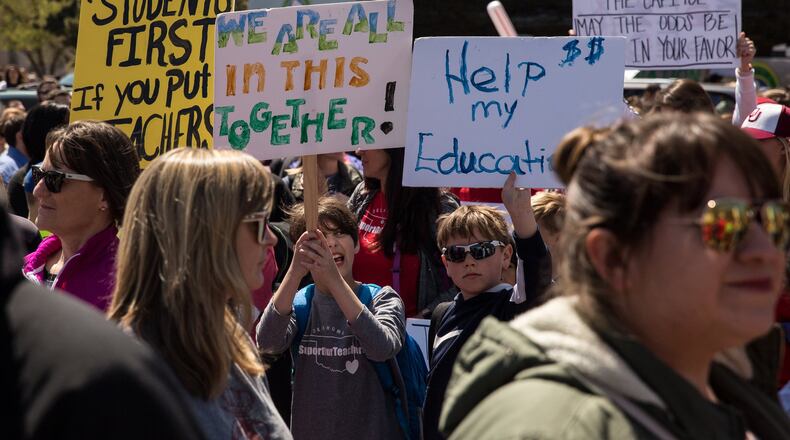Teachers have been agitating for more pay in several states, demonstrating and even walking off the job, but Georgia will likely avoid their wrath.
Politicians in this state risked a teacher backlash by giving more money to private schools during this year’s legislative session and by increasing the funding for state charter schools, but they balanced that with an increase in the overall public school budget. By walking that line between advocates for school choice and supporters of traditional public schools, Georgia’s leaders appear to have avoided the sort of classroom chaos seen elsewhere.
Teachers in West Virginia, Kentucky, Oklahoma, Arizona and Colorado have been protesting. Most of those states, like Georgia, are Republican-dominated, but Georgia's GOP leaders appear to have navigated around the storm.
Georgia teachers remain concerned about funding and pay, said Elizabeth Rhodes, who handles government relations for Kennesaw-based Educators First, “but we don’t hear any great hue and cry about it.”
During the legislative session that ended last month, lawmakers rewarded state charter schools and, more controversially, private schools, giving both more money. The near doubling of private school tuition dollars funded by income tax credits was particularly galling for many public school teachers who endured years of "austerity" education budgets. Starting in 2003, Georgia began putting less money into public schools than its funding formula, mandated by a 1985 law, required. The shortfall eventually exceeded $1 billion a year, even as lawmakers were pushing to increase funding for charter schools and private schools.
“I think there are some people in the legislature who would love to privatize education,” said Michael Nance, a veteran educator who teaches history and government at Alpharetta High School. He said his personal finances suffered, with furloughs during the Great Recession followed by stagnant pay amid rising health care costs.
“I never expected to get rich, but we have not been treated as well as we should be,” he said.
Gov. Nathan Deal, whose administration benefited from a growing economy, gradually closed the gap between the state's education funding obligation and the amount actually allocated. Then, this year, with state tax revenue projections rising, he plugged the remaining $167 million hole.
The persistent annual shortfall could have been a political time bomb. But Todd Rehm, a political strategist, said the public school funding increases “acted as a pressure relief valve” that benefits Republicans.
Even so, Sue McDonald, a retired Forsyth County school teacher, would like to see the uprisings in other states motivate Georgia teachers to vote. The candidate for a nonpartisan school board seat of the Griffin-Spalding County School System seethed when Deal’s administration “dumped” rising insurance costs on teachers in years past, and was cynical about the timing of the end of austerity cuts just months ahead of the May 22 primaries.
“I think a lot of decisions true politicians make are about the upcoming elections,” she said.
Political observer Kerwin Swint said teachers are still "animated" by pay and benefit issues. The first statewide teacher pay raise in many years was a 2 percent increase in the 2018 budget, and there was no salary increase in 2019, despite the additional funding. Pay and benefits are always important, said Swint, a political science professor at Kennesaw State University. But he said fulfilling the mandate of the state's education funding formula for the first time in 16 years "went a long way toward smoothing the rough edges."
The result: Few candidates are talking much about education. “I think it’s not as big an issue as it has been in previous elections,” he said.
Craig Harper, executive director of the Professional Association of Georgia Educators, said public education in this state is stabilized by several factors: Georgia has a more dynamic and diverse economy than, say, Oklahoma, where the oil and gas industry is king; it has a stronger Democratic party that keeps Republicans “honest;” and it has plenty of lawmakers from rural areas where their friends and family work for the local school district. Voters’ 2016 rejection of Deal’s proposed state takeover of “chronically failing” schools shifted the conversation about education and gave teachers a sense that the public was with them, he said.
Despite ongoing wage complaints, Georgia typically ranks around the middle for school spending, unlike most of the states experiencing unrest. In National Education Association rankings, Georgia was 23rd for average teacher salaries (just over $54,000) in 2016. Arizona, Colorado, Oklahoma and West Virginia, meanwhile, hovered around the bottom. Only Kentucky, where teachers descended on their Capitol this month to demand more funding, had comparable pay, ranking 26th in the teacher organization's rankings.
On the last day of this year’s legislative session, lawmakers approved what, for teachers, was the most alarming bill. They increased the annual limit on the state’s tax credits for private school tuition contributions (taxpayers get a 100 percent credit for their “contributions” toward private school scholarships) to $100 million for the next decade, from the current $58 million. School choice advocates such as the Florida-based Foundation for Excellence in Education, founded by former Gov. Jeb Bush, hailed the legislation, but public school teachers had fought hard against it.
It was a bitter loss for the teacher lobby, but similar legislation had stalled in prior years, and Harper credited the delay to teachers' political clout. Fear of rousing them before this year's elections may explain why state leaders finally met their obligation to fund public education, he said. "I think it was a political calculation that was probably a wise decision."
State rankings for average teacher salary in 2016
Georgia: 23rd — $54,190
Kentucky: 26th — $52,134
Arizona: 43rd — $47,218
Colorado: 46th — $46,155
West Virginia: 48th — $45,622
Oklahoma: 49th — $45,276
Source: National Education Association
About the Author





